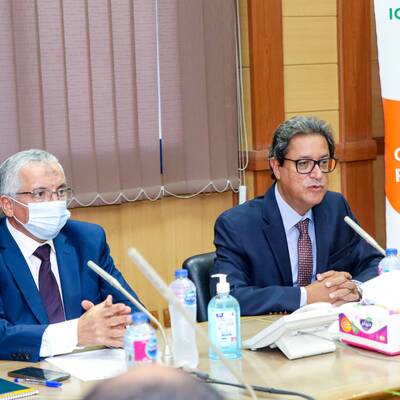ICARDA-ARC Egypt 2021 Annual Planning Meeting

8 September 2021, Cairo, Egypt – CGIAR Regional Director for CWANA and ICARDA's Director-General Aly Abousabaa and a delegation of ICARDA experts and team leaders met with officials from the Agricultural Research Center (ARC) in Egypt to discuss the agricultural research priorities in Egypt for the next two years. This meeting takes place every year to assess past results and renew commitments for collaboration that align with the national strategic plan for Egypt in agricultural development.
Over four decades, ICARDA and ARC's strong partnership has achieved significant and multiple results across all agricultural research sectors. For example, ICARDA and ARC have successfully developed important crop varieties tolerant to salinity and resilient to drought stress, pests, and diseases. In 2013, ICARDA also selected Egypt as the drylands reference site for CGIAR's dryland agricultural research across dry regions in Central and West Asia and North Africa, covering agricultural intensification, food system diversification, and irrigated farming system in dry regions.
During the meeting, Dr. Mohamed Soliman, President of ARC, outlined the challenges Egypt currently faces with the intensifying impact of climate change and skyrocketing population growth. Egypt is the 15th most populous country globally, and it relies on the Nile for 97% of its water while importing 40% of its food. Egypt has a population of about 102 million people, and according to current projections, Egypt's population is expected to double by 2078, requiring new and innovative approaches to production.
Egypt also faces existing and worsening high soil salinity levels. Approximately 25% of the areas in upper Egypt are affected by saline ranging from moderately saline to extremely saline level, making the growing of crops that require lower salinity increasingly difficult. Similarly, the northern parts of the Nile Delta are suffering from increasing soil salinization and heat stress due to climate change. Another reason for the increasing saline rate of soils is caused by improper irrigation and drainage practices which depleting groundwater resources too.
ARC’s Dr. Mohamed Soliman emphasized that "ICARDA and ARC must undertake important climate-smart agricultural research to provide the country's vulnerable populations with resilient livelihoods. Integrating new agricultural approaches into farming can mitigate and adapt to climate risks with soil salinity and water scarcity as a top research priority."

“The longstanding ICARDA-ARC partnership has delivered new climate-smart ways for Egyptian farmers to continue producing in spite of serious challenges due to climate change. Together we will continue to develop more innovations, improved crop varieties, and water-smart management to make farmers' livelihoods resilient to the challenges they face,” added Aly Abousabaa. Other objectives discussed at the meeting were:
-
develop wheat, barley, and legumes germplasm suitable for irrigated agriculture with high yield potential, good grain quality, and heat-, pest- and disease-tolerant.
-
make the germplasm freely available in international nurseries to national wheat breeding programs, particularly in the Central and West Asia and North Africa (CWANA) region.
-
Conduct all research in parallel with applying proven water management techniques and optimizing irrigation for seeds multiplication.
The ARC and the Ministry of Agriculture and Land Reclamation are ICARDA's leading partners in implementing research projects in Egypt related to sustainable development, food security, and water and land management. ICARDA now looks forward to the next phase of this productive and highly valued partnership with ARC to meet the country's needs as well as develop crop varieties and new innovative approaches for Egypt and across CWANA drylands
The current ARC/ICARDA collaboration project started in 2008 and included three phases, the first was between 2008-2013 (five years) and the second phase was between 2014-2019 (five years), and today we are in the third phase (three years) between 2020-2022.
